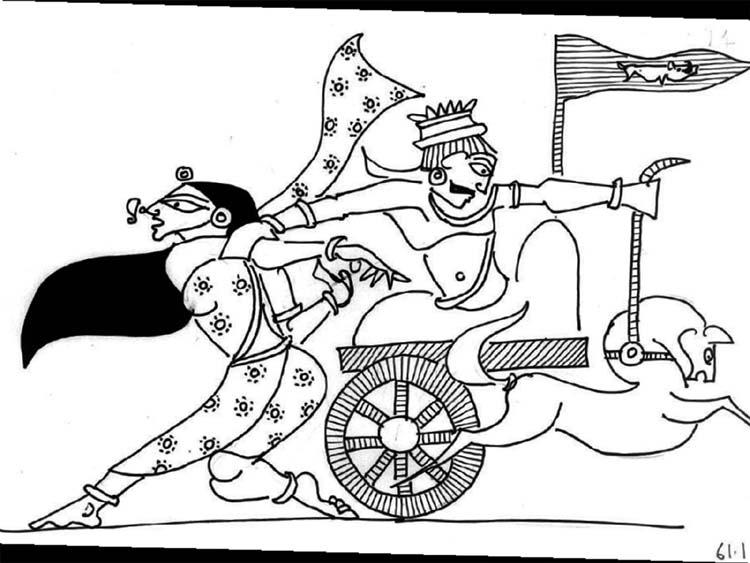#MeToo in Mahabharata
Published: 12:14 AM, 20 November 2018 Last Update: 12:17 AM, 20 November 2018
Political needs were placed over Draupadi's security

Devdutt Pattnaik
In the Mahabharata, we rarely hear about servants who served royal people. They are seldom mentioned and they don't play a critical role. The one exception to this comes in the thirteenth year of the exile of the Pandavas described in the Virat Parva.
The Pandavas, who gamble away their kingdom, are asked to spend twelve years of exile in the forest, and the thirteenth year they have to live incognito where no one can discover them. If discovered, they have to go back to the forest for another twelve years. So they disguise themselves as servants in the palace of king Virat. This is the only episode in the Mahabharata, where there is a careful understanding of what servants go through in palaces. This story has been told to draw the attention of people in power, of their abuse of it while dealing with those who have absolutely no power or very less agency.
A study of the Virat parva is critical, in this age of #MeToo where women have started calling out people who abuse their positions of power. Here, we learn how Yudhishtira, once the great king of Hastinapur and the scion of the Kuru clan, is now the king's companion and playmate. Whilst playing, Yudhistira's truthfulness so annoys the king once that the king slaps him. This unwarranted abuse of the eldest Pandava depicts a humiliating episode. While he was king, everyone bowed to him. But when he is seen as servant, he is physically violated.
Bhima, the mighty warrior, is a cook. All his life he loved to eat food, he was always given the first serving, usually ate the largest share of the food, and he even fought demons like Bakasura for food. But in Virat's palace he works as a cook who must feed everyone, before feeding himself. One can imagine the kind of restraint he has to put on himself, on his desires - an indicator of what a servant has to go through, restraining desires while in an ecosystem full of temptations.
Arjun is a womanizer; he loves women and is loved by them. But in Virat's palace he spends the entire year as a eunuch dancer, unable to indulge in his urges. Denied pleasure and like Bhima, he lives in an ecosystem of great temptations, unable to enjoy them. Nakul and Sahdev who always lived as princes have to serve as stable keepers, taking care of horses and cows of the king.
But, perhaps the worst in store is for Draupadi who becomes the hairdresser to Virat's queen and has to suffer the unwanted attentions of the king's brother-inlaw, Khichaka. He wants to have sexual relations with her and propositions her, and refuses to accept her no as an answer. In fact, the queen encourages Draupadi to take wine into Khichaka's room, clearly putting her in a vulnerable position. Draupadi runs to the king's court seeking protection, but there in public she is physically assaulted by Khichaka and no one comes to her rescue, neither the king nor her husbands who are in disguise.
Yudhishtra's argument is that he cannot afford to be identified during the thirteenth year of exile as it will lead his going back to the forest again - political needs are placed over her security. Nakul, Sahadeva and Arjuna do not want to disobey their eldest brother. But Bhima fights back, goaded by a furious Draupadi, tired of her husbands' restraint. Eventually, Khichaka is killed by Bhima, his bones crushed. His brothers who try to burn Draupadi alive (blaming the victim of abuse as is the wont of many) are also killed by Bhima. News of this spreads and the Kauravas suspect that the Pandavas may be hiding in Virat's kingdom.
The story, an interlude in the otherwise royal saga, draws attention to how staff, especially female staff, are treated in organisations by people in positions of power. People who are supposed to protect them end up as their abusers. In the Kaurava kingdom, Draupadi is abused by Duryodhana. In the forest, Draupadi is abused by Jayadrath who is left unpunished by the Pandavas as he is a family member. In Virat's kingdom, Draupadi is abused by Kichaka. These tales in the Mahabharata which has been narrated for over two thousand years is perhaps a reminder that the #MeToo campaign is not something modern, but just an expression of an ancient grievance.
Devdutt Pattanaik is an Indian author
known for fictional work and interpretations
of ancient Indian scriptures.




